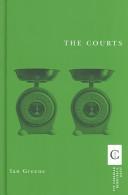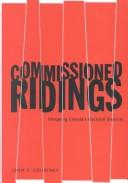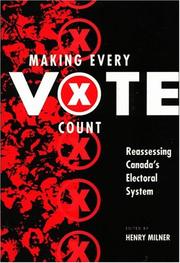| Listing 1 - 10 of 10 |
Sort by
|

ISBN: 1283131021 9786613131027 0774850884 9780774811019 0774811013 9780774809177 0774809175 9780774850889 9781283131025 0774811013 0774809175 0774809183 9780774809184 Year: 2004 Publisher: Vancouver UBC Press
Abstract | Keywords | Export | Availability | Bookmark
 Loading...
Loading...Choose an application
- Reference Manager
- EndNote
- RefWorks (Direct export to RefWorks)
Open and competitive elections governed by widely accepted rules and procedures are essential to the legitimacy of any political system. Elections assesses the history and development of five building blocks of the Canadian electoral regime: the franchise, electoral districts, voter registration, election machinery, and plurality voting. Arguing that on balance the Canadian electoral system is truly democratic, John Courtney demonstrates its vast improvements over the years. The right to vote is now generously interpreted. The process of redrawing electoral districts is no longer in the hands of elected officials. Voter registration lists include all but a small share of eligible voters. And those who manage and supervise elections on behalf of all citizens are honest and trustworthy officials. Using the recent push for reform of the plurality vote system as one example, Courtney also examines why certain electoral institutions have been amenable to change and others have not. In a democracy it is important for citizens to understand the most essential parts of their own electoral system. Elections is an ideal primer for undergraduate students, journalists, politicians, and citizens interested in the current state of Canadian democracy.
POLITICAL SCIENCE --- Political Process / Elections --- Elections --- Representative government and representation --- Voting --- Politics, Practical --- Social choice --- Suffrage --- Balloting --- Polls --- Political science --- Plebiscite --- Political campaigns --- Electoral politics --- Franchise --- Gouvernement representatif

ISBN: 128285366X 9786612853661 0773565698 9780773565692 0773513574 9780773513570 0773513582 9780773513587 Year: 1995 Publisher: Montreal ; Buffalo : McGill-Queen's University Press,
Abstract | Keywords | Export | Availability | Bookmark
 Loading...
Loading...Choose an application
- Reference Manager
- EndNote
- RefWorks (Direct export to RefWorks)
Do Conventions Matter? provides a complete overview of national party conventions in Canada, from 1919, when the first convention was held, to 1993, including the selection of Stanfield, Trudeau, Broadbent, Clark, Mulroney, Turner, McLaughlin, Chrétien, Campbell, and Manning. Courtney compares leadership selection practices in Canada with those in the United States, Britain, and Australia, and shows that Canadian conventions remain a distinctive means of choosing party leaders. Focusing on modern developments in the convention process, Courtney highlights changes in representation over the last thirty years, addresses criticisms about costs and delegate selection practices, and examines the role of the media. He concludes with an examination of the future of conventions in the context of Canadian democracy, given sky-rocketing costs, the movement to reform political parties, and the push towards a universal membership vote. He argues convincingly that the objectives of greater representation and greater democracy explain both the emergence of conventions to choose the leaders of federal parties and their possible demise in the near future.
Political conventions --- Conventions, Political --- Congresses and conventions --- Nominations for office --- Political parties --- History. --- Canada --- Politics and government --- Political leadership --- Prime ministers --- Selection and appointment

ISBN: 1282859447 9786612859441 077356943X 9780773569430 9781282859449 9780773522268 9780773522657 0773522654 0773522263 661285944X Year: 2001 Publisher: Montreal McGill-Queen's University Press
Abstract | Keywords | Export | Availability | Bookmark
 Loading...
Loading...Choose an application
- Reference Manager
- EndNote
- RefWorks (Direct export to RefWorks)
A study of institutional transformation and changing public and political attitudes toward the redistribution of electoral constituencies in Canada.
Book
ISBN: 0770510353 Year: 1973 Publisher: Toronto Macmillan of Canada
Abstract | Keywords | Export | Availability | Bookmark
 Loading...
Loading...Choose an application
- Reference Manager
- EndNote
- RefWorks (Direct export to RefWorks)
Book
ISBN: 9780195335354 019533535X Year: 2010 Publisher: Oxford Oxford University Press
Abstract | Keywords | Export | Availability | Bookmark
 Loading...
Loading...Choose an application
- Reference Manager
- EndNote
- RefWorks (Direct export to RefWorks)
Politics --- Canada --- Politics and government. --- Politique et gouvernement
Book
ISBN: 1895618037 Year: 1992 Publisher: Saskatoon, Sask. Fifth House
Abstract | Keywords | Export | Availability | Bookmark
 Loading...
Loading...Choose an application
- Reference Manager
- EndNote
- RefWorks (Direct export to RefWorks)


ISBN: 9781442602717 9781551112565 Year: 2019 Publisher: Toronto, Ont. University of Toronto Press
Abstract | Keywords | Export | Availability | Bookmark
 Loading...
Loading...Choose an application
- Reference Manager
- EndNote
- RefWorks (Direct export to RefWorks)
Digital

ISBN: 9781442671898 Year: 2016 Publisher: Toronto, Ont. University of Toronto Press
Abstract | Keywords | Export | Availability | Bookmark
 Loading...
Loading...Choose an application
- Reference Manager
- EndNote
- RefWorks (Direct export to RefWorks)
Multi

ISBN: 9781442671904 Year: 2016 Publisher: Toronto, Ont. University of Toronto Press
Abstract | Keywords | Export | Availability | Bookmark
 Loading...
Loading...Choose an application
- Reference Manager
- EndNote
- RefWorks (Direct export to RefWorks)
Multi

ISBN: 9781442671911 Year: 2016 Publisher: Toronto, Ont. University of Toronto Press
Abstract | Keywords | Export | Availability | Bookmark
 Loading...
Loading...Choose an application
- Reference Manager
- EndNote
- RefWorks (Direct export to RefWorks)
| Listing 1 - 10 of 10 |
Sort by
|

 Search
Search Feedback
Feedback About UniCat
About UniCat  Help
Help News
News